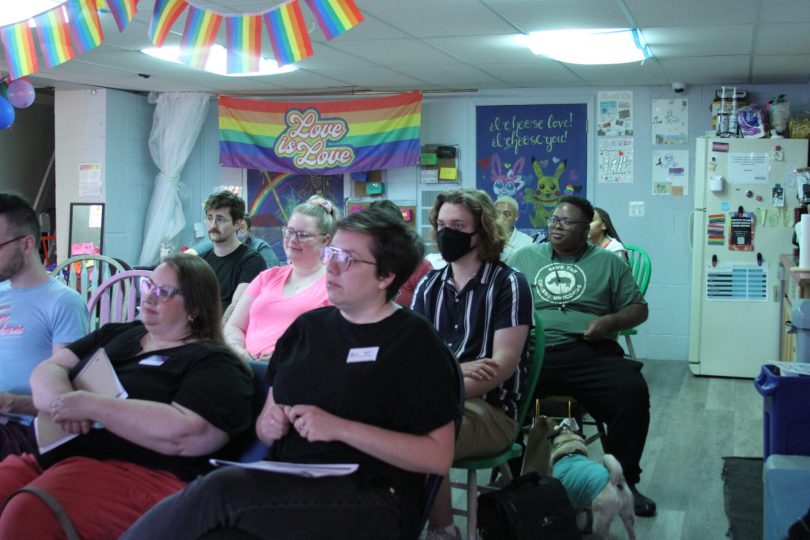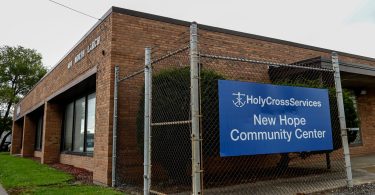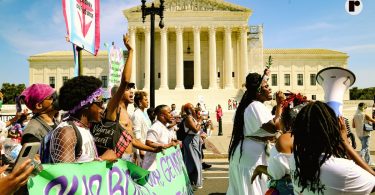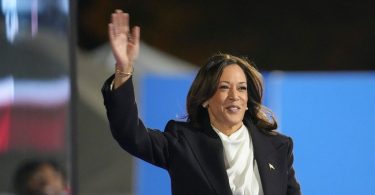As part of its education and advocacy programming across the country, the GLAAD Media Institute, GLAAD’s training, research and consulting division, convened a meeting with local leaders and community advocates in Grand Rapids, Michigan hosted and organized by Equality Michigan and The Grand Rapids Pride Center.
Attendees who complete a program or session with the GLAAD Media Institute are immediately deemed GLAAD Media Institute Alumni, who are equipped to maximize community impact by leveraging their own story for culture change.
“We are the oldest LGBT center in Michigan, actually. We just reached 36-years,” Jazz McKinney, executive director of the Grand Rapids Pride Center, told GLAAD after a media session in June. McKinney is a parent, a leader, and a mentor in their local community.
Grand Rapids Pride Center; photo by Lana Leonard
Throughout the decades McKinney says the Grand Rapids Pride Center has given the community a sense of stability for the LGBTQ community the center serves. McKinney has served in their role as executive director for nearly four years and in those four years rendered their leadership to the importance of continued learning, knowing “your history,” and LGBTQ stories.
In West Michigan LGBTQ stories are imperative.
And so is that of the Grand Rapids Pride Center, McKinney says. To know the history of the center, for McKinney and others, is to know how they’ve grown, and how they hold themselves accountable to the diverse communities they are a part of, want to serve, and do serve.
“We truly want to embody our mission when we say we want to be for all LGBTQ+ folks,” Mckinney said.
The 1987 March on Washington gave momentum to the original formation of the Grand Rapids Pride Center, says the center’s website. The date was Oct. 11 and a small group of lesbian and gay West Michiganders traveled to DC inspired to fight for equality.
After many meetings in each other’s homes, the center was born. Since then, the organization expanded to meet the needs of the bisexual, transgender, nonbinary, gender diverse, and Two-Spirit communities. Multiple members of the Grand Rapids Pride Center Community told GLAAD that the ability to adapt and meet the moment is vital.
Arriving into Grand Rapids last fall; photo by Lana Leonard
As of 2024, there are 373,000 LGBTQ people in the state of Michigan, according to the Movement Advancement Project (MAP). This number doesn’t necessarily account for the number of two-spirit (2S or 2-S) community members in Michigan and, not all indigenous people necessarily identify as two-spirit.
“The intersectional needs of the 2-SLGBTQ+ community in Grand Rapids today are, unfortunately, very similar to what they were in 1988 when the Grand Rapids Pride Center was founded, and they are very similar to the intersectional needs that exist elsewhere around the country today,” wrote Aaminah Shakur, the Grand Rapids Pride Center’s Accessibility/Healthcare Coordinator, to GLAAD in an email.
Today, the Pride Center continues to meet the moment.
“We are sitting here witnessing, as I type this, 10 months into a genocide in Palestine, 15 months into a genocide in Sudan, and at least 8 months of renewed genocide in the Democratic Republic of Congo,” Shakur wrote.
As of today, Uncommitted Democratic delegates are fighting to get Palestinian Americans on the Democratic National Convention (DNC) main stage. However, for the “the first time” party activists were given space at the DNC to hold a forum to discuss Gaza, according to AP News.
The Grand Rapid’s Pride Center has taken a public stance against all genocide and pinkwashing. As people drive into the Pride Center’s parking lot, a Palestinian flag painting sticks out along one window. For many, today, the call to fight against genocide in Palestine is what many people hear, but one they shouldn’t forget, according to Shakur. The reason they took this stance, “quite simply,” said Shakur, “is that all liberation is bound together in the liberation of each other.”
The Grand Rapids Pride Center’s Palestinian Flag; photo by Lana Leonard
They reminded readers that genocide is happening outside of Palestine, and under not only the watch of the current president, but “under the active support and provisioning” of the country’s current Congress.
In the same breath, Shakur adds, the ACLU reports that 527 anti-LGBTQ bills were introduced by anti-LGBTQ politicians this year. Each bill, at least 10 in Michigan, is working its way through state legislatures throughout the country, changing public perception with misinformation and legal attacks even if the bills don’t pass.
“The [current] administration earlier last month issued a statement that supported bans on surgical procedures for trans youth and instead limited support for trans healthcare to access to mental healthcare, which can be both stigmatizing and insufficient healthcare,” Shakur said noting how far misinformation has spread.
LGBTQ voters made the deciding difference in the 2020 election and are poised to do so again in 2024. More than 1 in 5 Gen Z Americans (ages 18-26) are out as LGBTQ, the most out generation in history. Nearly 30% of Gen Z women are LGBTQ, according to GLAAD’s fact sheet for journalists on DNC coverage.
For others, like Laurel Walker, a self-described disabled transgender woman, a parent, and board member of The Grand Rapids Transgender Foundation (attached to Grand Rapids Pride Center), believes the challenges are still present for transgender youth in Michigan, but not like it was when she was growing up.
In fact, she moved to Grand Rapids more than 30-years-ago to find the community she has today. Walker says that youth, while they don’t have it easier, they’ve more access to safety than she did. Walker is 54-years-old.
Laurel Walker speaks to Grand Rapids community members inside the Grand Rapids Pride Center; photo by Lana Leonard
“For me to admit I was trans when I was a teenager would have been horrible socially, but even worse,” Walker said. “Now, at least, there are protections in our anti-discrimination law in the state that are active and legal. In my time, there would have been no protection for me.”
LGBTQ protections were added into law last year after the Michigan Supreme Court ruled (5-2) that sexual orientation is covered under the Elliot-Larsen Civil Rights Act.
“There are state legislatures across this country dedicating themselves to legalizing discrimination,” Michigan Gov. Gretchen Whitmer concurrently told AP News. “In Michigan, we will keep expanding freedoms and getting things done on the issues that actually make a difference in people’s lives.”
Jazz McKinney (center) sits with GLAAD, and community members inside the Grand Rapids Pride Center; photo by Lana Leonard
Walker closed with a message for candidates on the campaign trail this 2024 election year.
“I just want them to understand [trans people]. We have one candidate of the major two who would be a horrible happening – I’ll let you figure out who that is – but the other candidates aren’t using this or taking [this] into consideration, they are just avoiding the topic,” said Walker.
McKinney elaborates on Walker’s words.
“Having proper representation on the political level certainly couldn’t hurt,” McKinney enunciated. Yet. “No matter who is in those seats, if they are not willing to stand up for what’s right, then it won’t matter.”
Being of the community and doing what’s right by the at-large community are important differentiations to McKinney and their staff. They want to see leaders in public champion that difference.
Visit GLAAD.org/VOTE to learn more about the GLAAD Media Institute’s role in community convening and what’s at stake for the LGBTQ community at-large this election year.







